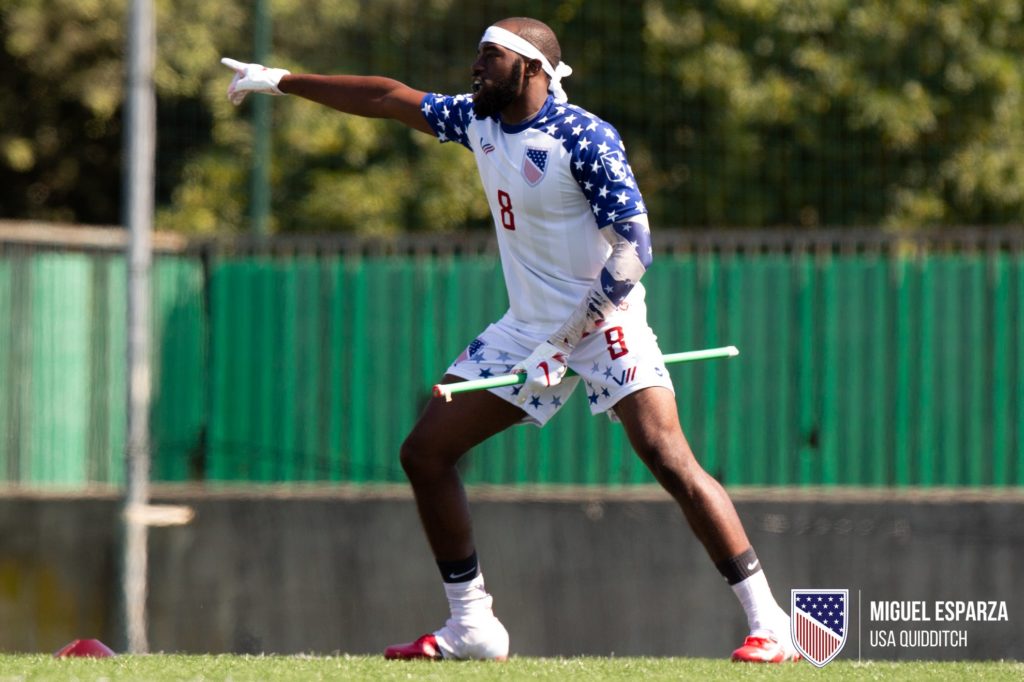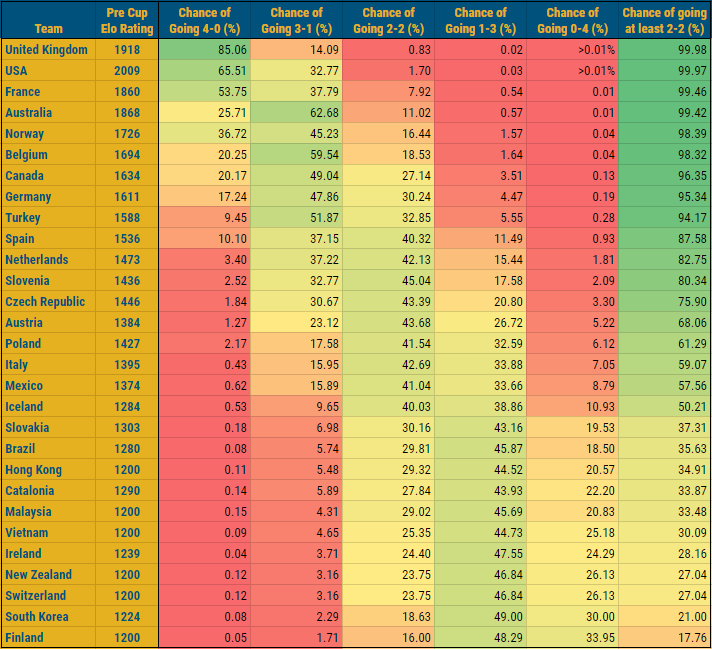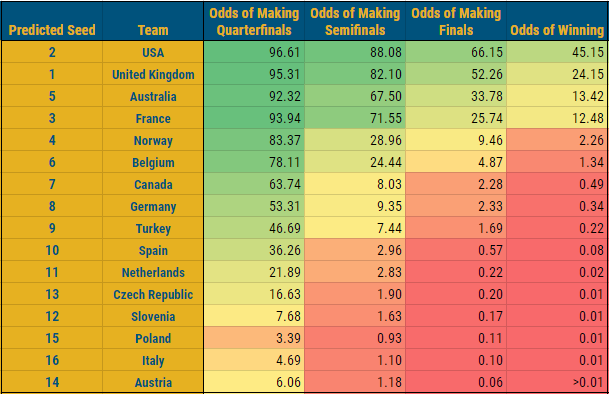Antwerp QC, Much of Belgian Core, Leaves Competitive Quidditch

Credit: Miguel Esparza
With the IQA World Cup rapidly approaching, and the recent release of our International Elo Ratings, it’s time we take an objective look at where teams stand entering this weekend. Since those standings were published, the 2017 Odense Games and international friendlies between Belgium, Germany and France have been added to the program, resulting in some small adjustments to those teams’s ratings. The recent release of pools gives us a couple clear storylines, but before diving in, several caveats should be made regarding the Elo ratings of these teams.
- For the sake of Elo predictions for this article, new teams are given an artificial Elo rating of 1200, which is roughly the level at which first-year international teams perform.
- The Odense Games featured three teams making their first international appearance (Czech Republic, Denmark and Iceland), meaning each entered that tournament with an artificially high average rating of 1500. This means that the Elo ratings of each team that attended that tournament (Czech Republic, Iceland, Ireland, Netherlands, Poland and Slovenia) will be slightly inflated going into World Cup.
- It has been almost two years since Australia, Canada, Mexico and the United States have competed at the international level. While these teams all could be at the same level they left in 2016, expect to see the results of these teams be slightly harder to predict by using their Elo ratings than those of their European counterparts.
With those facts in mind, let’s dive in.

Group A/Group B: European Games 2018
The initial picture of these groups seems to be that they are France’s to win, with Elo giving them a 72 percent and 82 percent chance of defeating Belgium and Turkey, respectively. That said, in France’s three matches against Belgium and one against Turkey since 2016, they have been unable to put either team out of range, despite going 4-0 in those matchups. An upset over France would give either team a likely route to going 4-0 in group play, locking them into a high bracket seed, but should things go as predicted, expect France to come out as the top-seeded team from these groups, with Belgium and Turkey making it to the upper bracket each with a 3-1 record.
Keep your eye on the Poland vs. Slovenia match, as its result could likely determine which of those teams makes the upper bracket and which is relegated to the bottom brackets. These pools will also feature Finland and Hong Kong playing in each team’s first international appearance, and South Korea making their second international showing after a spirited display at the last World Cup.
Relevant rematches:
- February 2018 Friendlies
- France over Belgium 110*-70
- France over Belgium 80*-60
- 2017 Odense Games
- Poland over Slovenia 140*-60
- 2017 European Games
- France over Belgium 80*-50
- France over Turkey 100*-60

Group C/Group D: Titans and Tossups
Should you only see one match between Group C and Group D, make it the Australia vs. U.S. rematch two years in the making. While Elo gives the U.S. a 69 percent chance of winning this matchup, it is sure to either be a close-fought match between two teams jockeying for high bracket seeding or give a clear picture of how the U.S. has returned their national program to order since their defeat at Australia’s hands in 2016.
Despite the Dutch team entering these groups with the third highest Elo rating after their 5-0 appearance at the Odense Games, they have never finished higher than Italy nor Austria at any international event where either team appeared. While it is extraordinarily likely that the U.S. and Australia go 4-0 and 3-1, or vice versa depending on the result of their game, the bottom of this pool is anybody’s guess. Recent results seem to point to Austria as the favorite to exit these pools 3-1. However, it remains to be seen if Italy can use a home-field advantage to their favor to make up for their two snitch-range losses to the Austrians at the 2017 European Games, or if the Netherlands can capitalize on their momentum coming out of the Odense Games last October. Only time will tell whether Brazil and Ireland can continue their rise in international relevance, with each bringing the deepest iteration of either team to date. Both should be able to secure at least a 1-3 record by putting experience to their advantage against a fledgling Vietnam who will be making their international debut in Florence.
Relevant rematches:
- 2017 European Game
- Austria over Italy 80*-50
- Austria over Italy 110*-70
- Netherlands over Ireland 100*-40
- 2016 IQA World Cup
- Australia over USA 150*-130
- Italy over Austria 140*-30
- Italy over Netherlands 140*-40
- USA over Brazil 210*-0

Group E/Group F: Fresh Crews and Breakthroughs
The eight teams in Groups E and F could not have asked for a better draw for this tournament. As the only set of groups without a team with an Elo rating of 1800 or higher, the top position out of these Groups is truly anyone’s game. While Canada has the most historical relevance in these groups, having never finished outside of the top four at any international event, Norway and Germany have both been recent rising stars at the international level, with Norway finishing third at the European Games in 2017, and Germany finishing fifth. Norway currently has the highest chance of any team in Groups E and F of finishing with a 4-0 record, at 37%, according to Elo. Canada follows with a 20% chance and Germany is close behind with 17%. It is almost a guarantee that these three teams make the upper bracket, likely followed by Spain, who is entering the tournament with the 10th-highest Elo rating, after finishing ninth in the 2017 European Games. Each group also features two teams who will make their first appearance at an event of this magnitude (Malaysia, New Zealand and Switzerland have yet to compete on an international level, and Iceland has only attended the Odense Games). That means that the bottom of these groups should feature some potentially important and certainly competitive matchups. If any of these teams can go 2-0 against the other first-time teams, they have a solid shot at earning a slot in the upper bracket and at fighting for a top 16 position. If any first-year team can do it, expect it to be one of these.
Relevant Rematches:
- 2017 European Games:
- Germany over Spain 120*-20
- 2016 World Cup:
- Norway over Germany 80*-60
- Norway over Germany 140*-60
- Canada over Spain 170*-30

Group G: The Monarchy Reigns
It was already evident that whatever top-seven team was given Group G would get a cakewalk to a high seed, but the fact that the spot went to the No. 2 Elo-rated United Kingdom, and that the group was filled with relatively easy competition for them, means Team U.K. should be the odds on favorite to earn the one seed in bracket. Elo gives the UK an 85 percent chance of going 4-0 in group play—almost 20 points higher than the second-highest US team, which has a 65.5 percent chance of doing the same. Even when you assume that Elo underrates a Mexico team that will feature a solid mix of players from the Mexican and USQ leagues, you have to assume that the newly-formed Czech team is overrated with a rating of 1446 and a disappointing showing at the Odense Games–their first international appearance. The bottom of this pool is wide open, but if Mexico can capitalize on their talented pool of players, expect them to take the second spot in this group, no matter what Elo predicts.
Relevant Rematches:
- 2017 European Games
- Catalonia over Slovakia 100*-30
- 2016 IQA World Cup
- Mexico over Catalonia 260*-130
Who Makes Bracket?
Using Elo ratings and the group matchups, we are able to predict the odds of each team’s performance in group play, giving us the table below.

While it’s impossible to predict seeding exactly, this table gives us a good picture of what it might look like. Teams are sorted by how likely they are of going at least 2-2 in day one (on average, only two teams that go 2-2 will miss the upper bracket), giving us a decent sorting. The only notable exception is that Australia is slightly more likely to receive the fifth seed and Norway slightly more likely to receive the fourth seed due to their odds of going 4-0. This gives us the following 16 teams, and their following chances of making the each round of bracket play (assuming that each of these teams make bracket at their Elo-predicted seed).

International quidditch can often be hard to parse. More than 40 percent of the attending teams haven’t set foot on a pitch in two years or more, and more than half haven’t played in almost a year. In that time, rosters have changed, experience has grown and play styles have diversified, leaving the field as unpredictable as ever from top-to-bottom. While these Elo ratings cannot tell us everything about a team’s quality, they provide a solid starting point for understanding which teams have outpaced the rest of the world in growth, and help predict close games between two teams that have never met one another on the pitch before. So get ready for the biggest weekend international quidditch has ever seen—and if there are any bookmakers using these predictions–don’t count Mexico out.
Archives by Month:
- May 2023
- April 2023
- April 2022
- January 2021
- October 2020
- September 2020
- July 2020
- May 2020
- April 2020
- March 2020
- February 2020
- January 2020
- December 2019
- November 2019
- October 2019
- August 2019
- April 2019
- March 2019
- February 2019
- January 2019
- November 2018
- October 2018
- September 2018
- August 2018
- July 2018
- June 2018
- April 2018
- March 2018
- February 2018
- January 2018
- November 2017
- October 2017
- July 2017
- June 2017
- May 2017
- April 2017
- March 2017
- February 2017
- January 2017
- December 2016
- November 2016
- October 2016
- September 2016
- August 2016
- July 2016
- June 2016
- May 2016
- April 2016
- March 2016
- February 2016
- January 2016
- December 2015
- November 2015
- October 2015
- September 2015
- August 2015
- July 2015
- June 2015
- May 2015
- April 2015
- March 2015
- February 2015
- January 2015
- December 2014
- November 2014
- October 2014
- September 2014
- August 2014
- July 2014
- May 2014
- April 2014
- March 2014
- February 2014
- January 2014
- November 2013
- October 2013
- September 2013
- August 2013
- July 2013
- June 2013
- May 2013
- April 2013
- March 2013
- February 2013
- January 2013
- December 2012
- November 2012
- October 2012
Archives by Subject:
- Categories
- Awards
- College/Community Split
- Column
- Community Teams
- Countdown to Columbia
- DIY
- Drills
- Elo Rankings
- Fantasy Fantasy Tournaments
- Game & Tournament Reports
- General
- History Of
- International
- IQA World Cup
- Major League Quidditch
- March Madness
- Matches of the Decade
- Monday Water Cooler
- News
- Positional Strategy
- Press Release
- Profiles
- Quidditch Australia
- Rankings Wrap-Up
- Referees
- Rock Hill Roll Call
- Rules and Policy
- Statistic
- Strategy
- Team Management
- Team USA
- The Pitch
- The Quidditch Lens
- Top 10 College
- Top 10 Community
- Top 20
- Uncategorized
- US Quarantine Cup
- US Quidditch Cup
